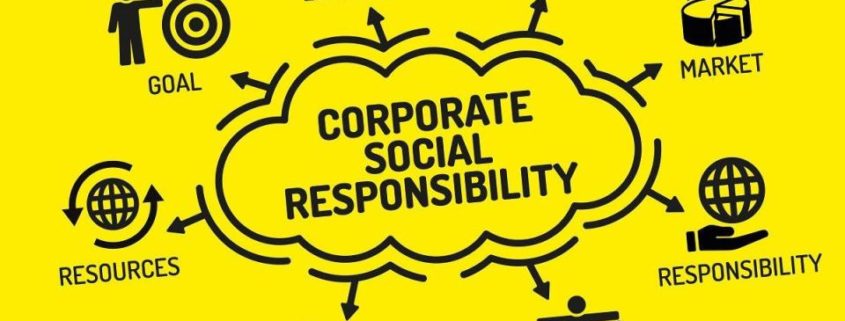CSR and Its Growing Importance
It may come as no surprise that corporate social responsibility (CSR) has become a most for businesses all across the world. Organisations that are committed to CSR know that it leads to an enhanced reputation. It is of the utmost importance to establish a clear CSR strategy in order to assure the organisation’s competitiveness in the industry it’s doing business. This normally requires policies which integrate numerous aspects such as social, ethical, environmental, human rights or consumer concerns into daily business operations and the company’s core strategy.
Generally, companies are looking at achieving a positive impact on a community or society as a whole whilst also creating value for the business owners, its employees, shareholders and stakeholders.
In a study done by Kenexa High Performance Institute in London 2015, has found that organisations that had a genuine interest and commitment to CSR clearly surpass those that did not engage in such activities. Furthermore, the study has also revealed that CSR-orientated organisations had a higher level of employee engagement and also offered a better customer support service. At a corporate level, CSR brings a lot of positivity and optimism, even though at organisational level companies do not always accept their responsibilities for CSR, with plenty of businesses admitting adopting CSR purely as a marketing ploy.
At this moment in time, it is vital that we try and create a more sustainable form of capitalism if we are thinking about building a more inclusive, prosperous society and avoid the catastrophic climate changes that are getting closer and closer. The idea for CSR has been around for some time now, so how come it has become mainstream as of late?
The influence of Millennials on CSR policies
It is obvious to everyone that millennials are a growing force in the workplace. Young adults nowadays focus on a company’s impact on the environment and even urge these organisations to have a clear social mission.
Millennials are tech-savvy people, and they immediately research a company and are looking into its ethical and labour practices. Numerous millennials feel like it is their duty to make the world a better place to live in and they do not want, under no circumstances to be associated with companies which do not take responsibility for the world and the people in it.
Interestingly, in a recent Deloitte survey, it has been revealed that employee engagement is closely tied to the CSR reputation an organisation has. A whopping 70% of millennials interviewed have recognised that a company’s desire and commitment to CSR has influenced their choice to work for them. In just a couple of years, millennials will become the leading generational segment in the workforce, thus meaning that companies that wish to hire new workers will have and need to adopt CSR in order to keep the business going. Furthermore, millennials wish to actively partake in these social and environmental changes, not only consume products by companies who engage in CSR projects.
Huge companies have decided to engage in mammoth-sized CSR campaigns and that is great news. For example, Apple, which is a tremendously powerful company, can influence with its actions the whole industry. If an issue becomes a priority for Apple, it is clear that will make the ecosystem shift. At the same time, it is easier for big organisations to focus on CSR initiatives because they are less subject to quarterly pressures. It is easier to focus on long-term plans.
There is a definite need for big firms to commit to renewable energy and to lobby for the change in legislation that imposes harsher costs for fossil fuel buyers. There is also a need for big companies to commit to raise the minimum and to lobby for a change in minimum wage legislation. To say they’re not going to dump stuff in the river, or buy from those who do. The top 500 organisations’ revenues are worth nearly 37% of world GDP. Think about what would happen if we could convince 100 of them to go carbon-free and to take a less hostile view of their labour force?
An example of a better-pay practice is the behemoth Cola-Cola and its “5by20” programme. This initiative has been created to empower 5 million women entrepreneurs around the world by 2020. Recent research has indicated that empowering women can have a long-lasting effect and to name a few: increased revenues, more hired work, better-educated and healthier families – all of which lead to more prosperous and happy communities.
Whatever cause your organisation supports, be sure to be transparent and honest with your customers. Authenticity is the key to being successful at anything; otherwise, you will be labelled as deceitful and will lose the trust of your customers. Trust represents the most fragile relationship you could ever have. Once it’s gone, you’ll find it next to impossible to get it back.
In conclusion, corporate social responsibility is more than just a business trend or fad. Businesses that want to stay relevant to new generations and who want to help people in need around the world while increasing their own revenue and efficiency will benefit from embracing CSR.
Great People Inside provides easy-to-use tools and processes to attract, assess, match, select, onboard, manage, develop, benchmark and maintain workforces anywhere in the world.
Finding the right talent, the best fit for the job and your organisation can be a very challenging task. It requires deep knowledge of your own organisation’s culture and a keen understanding of the candidate’s personality, strengths, interests, work style and other characteristics. Our technology and solutions will do the work for you, helping you find employees who can flourish and reach the highest performance required to constantly bring your company forward.
Request a free demo:
Sources:
https://hbr.org/2018/02/more-and-more-ceos-are-taking-their-social-responsibility-seriously
https://www.financierworldwide.com/the-importance-of-corporate-social-responsibility/#.WoP3VtVubIV
https://onlinemasters.ohio.edu/why-corporate-social-responsibility-matters-in-todays-society/
https://www.entrepreneur.com/article/269665












